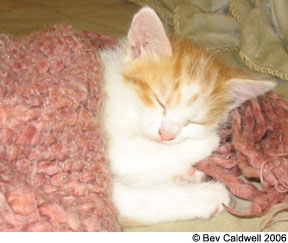Each year, from April to November, hundreds of thousands of kittens are born – often to feral or stray moms that eke out a meager existence on our city streets, in the suburbs and in rural areas across America. Without human intervention, most of these newborns would die or, at best, lead short, miserable lives. The moms that are not killed by cars, other animals or disease will repeatedly become pregnant, adding to the already crushing pet overpopulation problem.

288
Whats a caring animal lover to do?
Aside from ensuring that your own cats are spayed and neutered, consider fostering a litter of homeless kittens. Sadly, many animal shelters dont have the staff or resources available to care for kittens that are ill or too young for adoption. Newborn kittens that have lost their mom must be bottle-fed around the clock and their tiny bladders and bowels must be coaxed to empty on a regular basis. Animal shelters that have kitten foster programs in place need dedicated people who are willing to welcome kittens into their homes and nurture them until they are old enough to be placed for adoption.
Fostering – Getting Started
Place your foster family in a separate bedroom, laundry room or bathroom, if you have other animals. Dont allow your other cats to mingle with the foster kittens, even if the kittens appear healthy, just to make sure that your regular housecats dont catch an infectious disease. And to be on the safe side, make sure to wash your hands after handling the kittens. Make sure the kittens new digs are warm, quiet and secure and well equipped with soft blankets or towels, a large cardboard box or cat carrier, a warm water bottle covered with towels for the kittens to snuggle against, shallow food and water bowls, small litter boxes, scratching posts and toys (a humble cardboard toilet paper roll or feathers can entertain kittens for hours). Purchase an unscented clay litter. It may be safest to avoid using clumping litter for very young kittens because they tend to nibble on litter. The clumping variety purportedly can become impacted in their stomachs, causing severe illness or even death, although the real danger is likely overstated.
Kittens grow quickly, and by the time they reach two pounds (at approximately eight to nine weeks of age) they can be spayed or neutered, tested for various infections and vaccinated. Your job as a foster parent is nearing completion, but dont despair. After weeks of generously giving your surrogate family the love, care and socialization skills they so desperately needed, each kitten is ready to be placed in a loving, permanent home.
If you are interested in giving abandoned kittens a healthy start in life, call your local humane society or animal shelter and inquire if they have a kitten foster program.
What You Need to Know
HEAT: Immediately warm the kitten by wrapping it in a towel or placing it in a warm room. Place the kitten next to a warm water bottle wrapped in a towel. (Avoid electric heating pads, because they can burn kittens, even if covered with a towel).
HYDRATION: Its very important that kittens receive enough fluids. Kitten Milk Replacement (KMR) is a popular formula that comes in an easy-to-mix powder variety or premixed in cans. Make sure all liquids, including water, are served lukewarm. Hold the kitten upright (not cradled like a baby) and SLOWLY feed the kitten, using a small bottle or syringe. At approximately six weeks of age, kittens will begin to drink water from a bowl, so be sure to provide fresh water at all times.
HYGIENE: Keep a supply of baby wipes or washcloths on hand to clean the kitten and wipe up any spills or accidents. Mom cats will lick their kittens genital area to stimulate bodily functions. If a mom is not available, encouraging bladder and bowel movements becomes your task. Wrap a warm, wet cloth around your finger and stroke gently in a circular motion on the kittens anal/genital area. Once the kitten is older, shell begin to use the litter box on her own. Be sure to clean all litter boxes on a daily basis.



